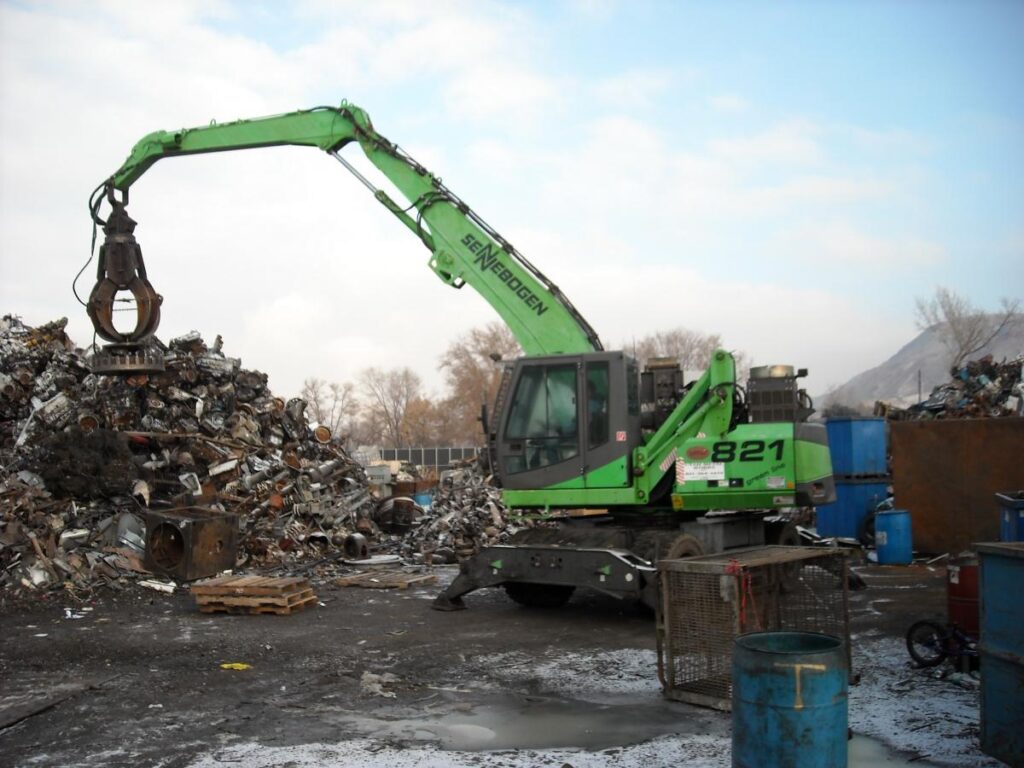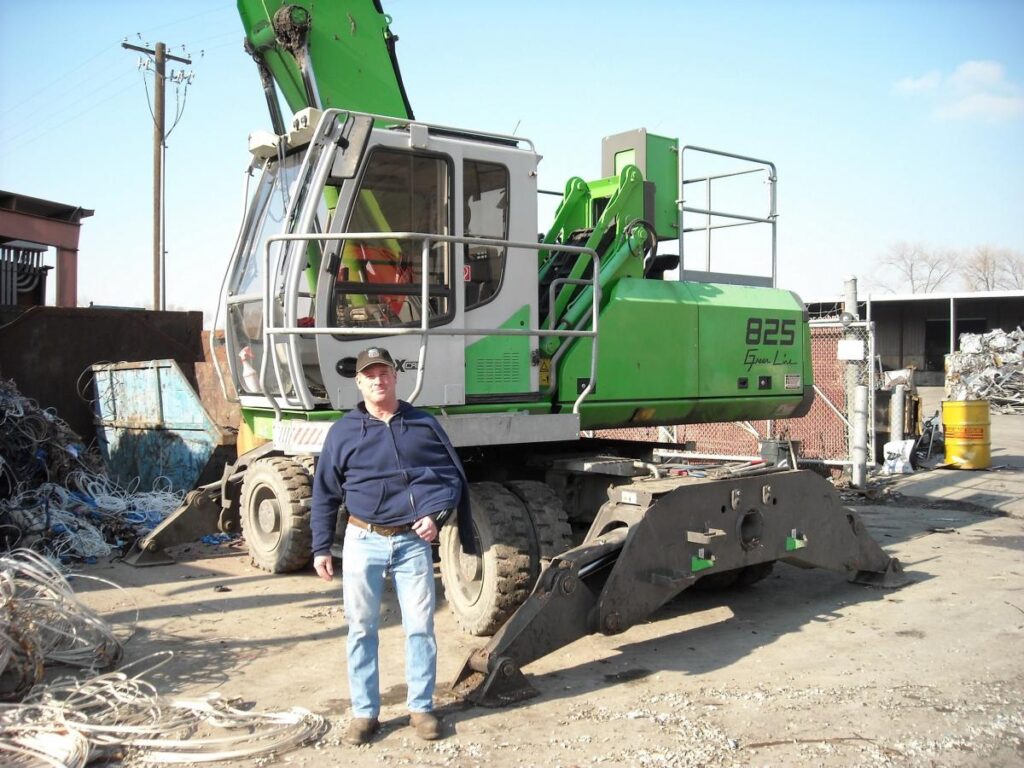Salt Lake City, UT – For the equipment needs of family-owned Utah Metal Works (UMW), purpose-built SENNEBOGEN material handlers compare favorably to what’s available on the market. But it’s not just about machine price and features.
Third-generation co-owner, Chris Lewon has zero reservations about what the differentiator is whenever UMW is faced with an equipment buying decision. The local dealer, in this case Rasmussen Equipment Company, is the key.
“Like it or not, equipment does have its downtime. It’s part of doing business,” explains Lewon. “The equipment gets beat up – it does – and it is going to go down at the wrong time, at the worst time. Your relationship with the dealer, and having immediate access to parts and service, is extremely important.”
Wheeled material handlers fit the bill
UMW made the move to SENNEBOGEN material handlers 12 years ago, when the company modernized its busy 10-acre, mostly non-ferrous metal scrap recycling yard in Salt Lake City. This upgrade included paving more than 90 percent of the yard with concrete, directing Lewon toward purpose-built wheeled machines and away from traditional converted tracked excavators.
“We went with SENNEBOGEN for a couple of reasons: One, access to some of the most common parts that typically fail, like hoses and fittings, and the accessibility to easily change in and out those parts. Second, we had a longstanding relationship with Rasmussen Equipment, which sells and services SENNEBOGEN equipment here locally,” says Lewon. “We thought that the service and having ready access to parts through a local dealer would be advantageous to us longer term.”
Now, more than a decade later, UMW’s SENNEBOGEN material handlers work in the company’s recycling yard. From a scheduled engine replacement all the way down to a sudden hydraulic hose replacement, having a well-stocked, well-trained dealer available nearby is essential to Lewon.
“That $30 part all of a sudden becomes a $10,000 downtime incident,” he explains. “The cost of whatever fails is greatly exceeded in about two seconds of downtime, so that’s where it is really important to have a working relationship with the dealer’s parts and service folks to keep this equipment up and running.”
Company sizes up machines
With its latest SENNEBOGEN, Utah Metal Works made the move from the 52,800 lb. (23,950 kg) 821 M machines to the beefier 64,250 lb. (29,144 kg) 825 M. The larger machine offers more reach and lift capacity, yet maintains the maneuverability required on the compact Salt Lake City site.
“The 825 is our workhorse, no question,” says Lewon. “We looked at the next size up and we could probably use it in most of the applications. However, there are some where a larger machine would be a little tight for our facility. The 825 seems to be a very good size for what we consider to be a medium-size processing facility. And we don’t do a tremendous amount of steel – ferrous material – and the larger-capacity machines seem to be a little more geared for that.”
A long history of scrap recycling
Purchased in 1955 by three brothers, including Lewon’s grandfather Harry, Utah Metal Works quickly transitioned to the recycling focus it retains today under the direction of Don Lewon, Chairman of the Board and Don’s two sons, Mark, President and Chris, Vice President.
“I tell people who are not familiar with the metals recycling business that we’re kind of a reverse wholesaler,” says Chris Lewon. “We buy from thousands of customers and then sell to a few hundred.”
Scrap metals from industrial operations ranging from aerospace and transportation, manufacturing to construction and demolition are trucked in to the UMW yard. They are sorted for sale to local and international customers, who use the cost-efficient recycled alloys in their manufacturing processes.
“Most of the material we source is within a 500 mile radius,” says Lewon, “but when we package material, then it has the ability to travel internationally, as well as stay locally.” Shipments have been made to as far away as India, China and Korea, with a considerable amount heading to local foundries in the western US that make steel, aluminum, stainless and brass castings.
“We are also open to the public,” says Lewon. “This gives us good exposure to all varieties of scrap.”
Rotating grapples ‘extend’ operator’s hand
UMW’s current SENNEBOGEN units are equipped with four-tine grapples with rotators; the larger and busier of the machines has the SENNEBOGEN attachment. “In the wire processing world,” explains Lewon, “having a rotating grapple is a huge advantage to unspool material, unload and place precisely.”
That precision – “the grapple is almost an extension of the operator’s hand” – has earned good comments from truck drivers and other customers bringing scrap metal to the UMW yard. Metal is picked off trailers without ripping up the plywood and boards often in place as temporary sides on the flatbeds. “I always joke with customers, ‘If you want, the operator can scratch your back with the grapple.’ Nobody ever takes me up on that,” Lewon says with a laugh. “They could do it. I don’t encourage it of course. But it is a compliment to the responsiveness of the hydraulics and the operator’s skill.”
In the beginning, there was “a leap” for the operators first moving to purpose-built material handlers, “but there’s absolutely no way going back now,” he says. “It was a fairly quick learning curve. Once they had some time in that SENNEBOGEN, they sure as heck didn’t want to go back.”
SENNEBOGEN’S hydraulically-raised maXCab “definitely gives an extreme advantage to our operators in being able to pinpoint and put material where they want it,” says Lewon. “They also have greater visibility when either unloading trucks or loading trucks, and also feeding the equipment we run, particularly the wire chopping equipment.”
Strong dealer support
UMW crews do some basic machine maintenance themselves, but depend on the well-stocked Rasmussen Equipment Company for the bulk of SENNEBOGEN service, says Lewon. In the rare occasions when necessary, SENNEBOGEN has been able to provide next-day service from its recently-expanded 100,000 sq. ft. parts facility in Stanley, NC, he commends.


